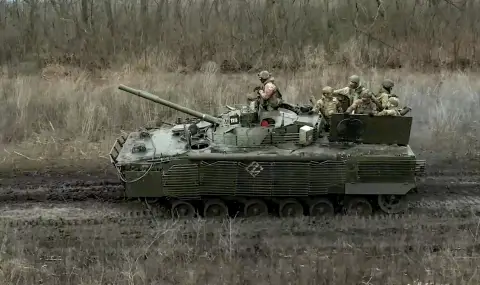The progress is limited but steady. For several weeks, the Russian army has been advancing at several points on the Ukrainian front and snatching territory, which has increased doubts about Kiev's ability to reverse the trend, BTA reported, citing AFP.
According to an analysis by Agence France-Presse based on data from the American Institute for the Study of War (IWW), since the beginning of October, President Vladimir Putin's army has advanced 478 square kilometers on Ukrainian territory. This is the largest monthly advance of the Russian army since the first weeks of the war.
"Russia has been on the offensive all year long. But the past week has been one of the most difficult, if not the most difficult, for the Ukrainian armed forces during this period," notes the opposition Russian website "Meduza", which is banned and blocked on Russian territory. The IEV data does not suggest a military collapse of Ukraine. "What is more worrying, however, is that this is a trend", says former French colonel and military historian Michel Goya.
"We are witnessing an acceleration of this process with the feeling that it cannot be stopped", he adds. According to him, the Russian strategy is to put pressure everywhere, all the time, waiting for things to crack, crumble or collapse. Almost every day Moscow celebrates a victory. "No single settlement is of exceptional importance, but overall this is a great success for the Russian army," says independent Russian military analyst Alexander Khramchikhin. According to him, the Russian offensive, although not very fast, shows the increasing deterioration (of the situation) in Ukraine.
Since 2022, Moscow has maintained the superiority of its artillery. Despite Western sanctions, Russia has transformed its economy into a war machine with the support of loyal allies, led by Iran and North Korea. “The Russian military industry produces more weapons than Ukraine receives. There is also more ammunition thanks to its industry, as well as thanks to North Korea,“ says Alexander Khramchikhin.
According to Michel Goya, the freezing by Congress of US aid to Ukraine at the beginning of the year significantly slowed down deliveries to Kiev, while at the same time 3 million North Korean shells arrived in Russian warehouses. And Moscow has developed a bomb-targeting system that it uses "by the thousands," he says, referring to the estimated 1,600 North Korean KN-02 ballistic missiles that have fallen on Ukrainian territory.
His assessment is that Russia has adopted a new tactic. Instead of taking cities district by district, the Russian army is now trying to suffocate them. "The principle is to threaten to encircle already created "pockets" from which Ukrainian troops are forced to withdraw," explains Michel Goya. "We refused to storm cities and villages head-on, where we had to fight for every square meter of street, every house," agrees Alexander Kots, a military journalist who writes for Komsomolskaya Pravda, a popular daily newspaper in Russia. As a result, "the enemy may be forced to withdraw his troops and do so by crossing a long corridor open to shelling."
The Russian offensive is gradually undermining Ukrainian morale. Kiev is struggling to recruit new soldiers. The disorganization of the army and corruption make it easy for desertions and refusals to enter service. "To defeat the enemy is to kill his hope. When the sacrifice of the dead is useless, there is no point in fighting anymore," Michel Goya notes.
According to a French military official who requested anonymity, Zelensky's government, which is facing war fatigue among the civilian population, is struggling to mobilize. Kiev announced a new mobilization of 160,000 people yesterday. The mobilization is linked to concerns about the deployment of North Korean troops to fight on Russia's side, to fill the army's ranks to 85 percent. Experts say the situation is not that dire and emphasize the very heavy losses on the Russian side. Ivan Klišč from the International Center for Defense and Security in Estonia points out that at the current pace of progress, Moscow will complete the capture of the rest of Donbass in a few months, but at an extremely high and probably unbearable price.
At the same time, the West is hesitant. Ukraine's allies are divided over Volodymyr Zelensky's "Plan for Victory", which was supposed to put it in a strong negotiating position. In addition, uncertainty is also building around the US presidential election. "Ukraine will soon realize that it needs to change direction and that relying entirely on its Western partners in the near future will become a counterproductive strategy," says Ivan Klishch. According to him, the deployment of North Korean soldiers to the front could hasten Western action, but "it is still unclear whether this will strengthen Western support for Ukraine or just new promises. We will have to see".
